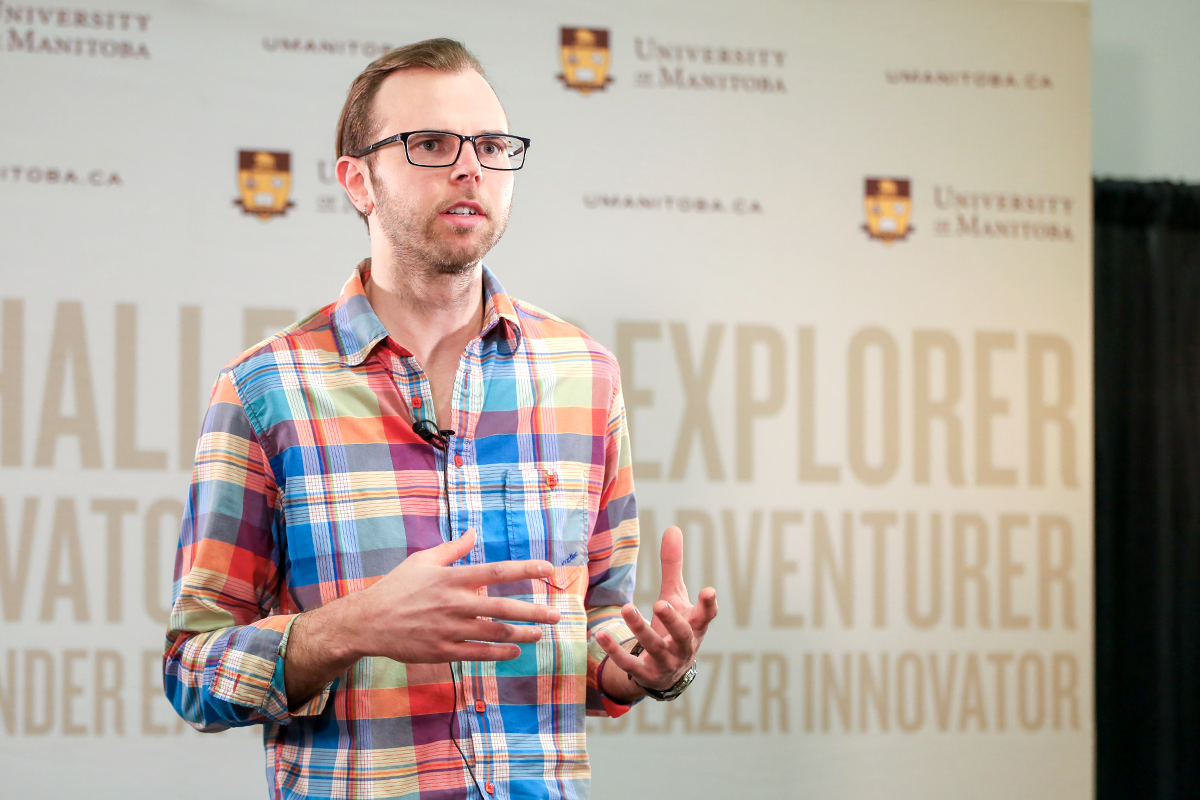
Matthew Cook PRESENTING AT THE 2018 THREE MINUTE THESIS (3MT®) COMPETITION.
Helping people with undiagnosed needs
Matthew Cook has built an artificial intelligence to help people who suffer from undiagnosed mental illness.
Cook, a master’s student in psychology and 3MT finalist at the University of Manitoba, does cutting-edge research in artificial intelligence (A.I.) and mental health alongside his advisor Randy Jamieson.
Growing up in Winnipeg, Cook never felt pulled toward any particular career field but in his second year of undergrad at the U of M he enrolled in one of professor Jamieson’s courses. He fell in love with cognitive psychology, specifically the computational modelling approach, which is odd because it requires a lot of math and he distinctly remembers disliking math throughout his life. (“As a graduate student now developing artificial intelligence, I’ve realized A.I. has less to do with The Terminator and more to do with Pythagorean’s Theorem.”)
“I went into cognitive psychology because I want to understand the processes that allow us to do all the amazing things we do that also come so naturally—perceiving, remembering, using language and more,” Cooks says. “I want to understand these processes and install similar processes in machines to develop artificial intelligences that take human cognition as their inspiration.”
This is a daunting task, one corporate giants like Google and Facebook are grappling with. But whereas they attempt to engineer a brain from scratch, Cook took a different route, borrowing our brain’s processing tricks and inserting them into software with a goal of helping people with undiagnosed mental health needs.
Psychological diagnosis relies upon understanding and interpreting language people use to describe thoughts and emotions. Cook designed and developed A.I. technology to diagnose mental health by examining the language people use—not just key words, but abstract representations too. His system identifies key passages of speech or text that offer diagnostic windows into the health of a patient’s mind.
His software doesn’t counsel; it identifies those who have fallen, or are sliding into depression. It can provide mental health diagnostic services to people in remote locations, where mental health workers are scarce or nonexistent yet the need is great: The Manitoba Government has noted that one in four Manitobans had a mental illness diagnosed between 2001 and 2006. Likewise, The Manitoba Centre for Health Policy at the U of M reports that 14 per cent of Manitoba’s children are living with at least one mental disorder.
The social, emotional and economic costs of mental illness are staggering, and the United Nations projects them to only grow. The situation seems bleak, and dark.
But Cook has created an emergency flare, one that casts light onto those who need it, so we know where to send help.
Meet the other new faces of innovation and discovery.
Research at the University of Manitoba is partially supported by funding from the Government of Canada Research Support Fund.






